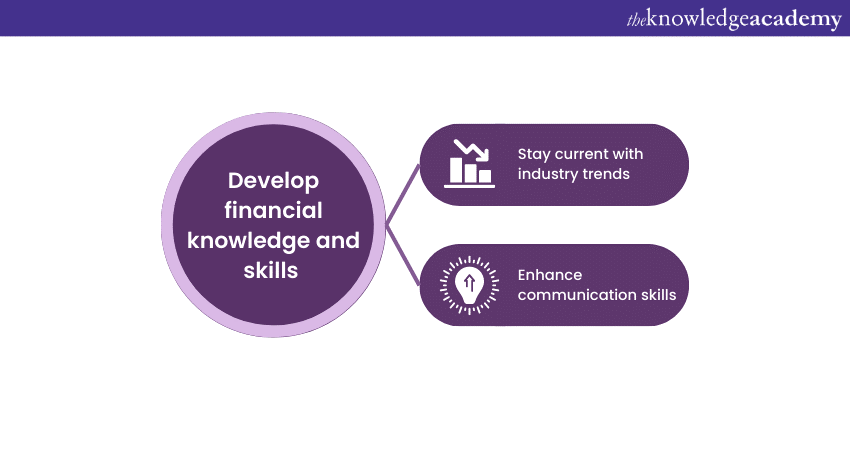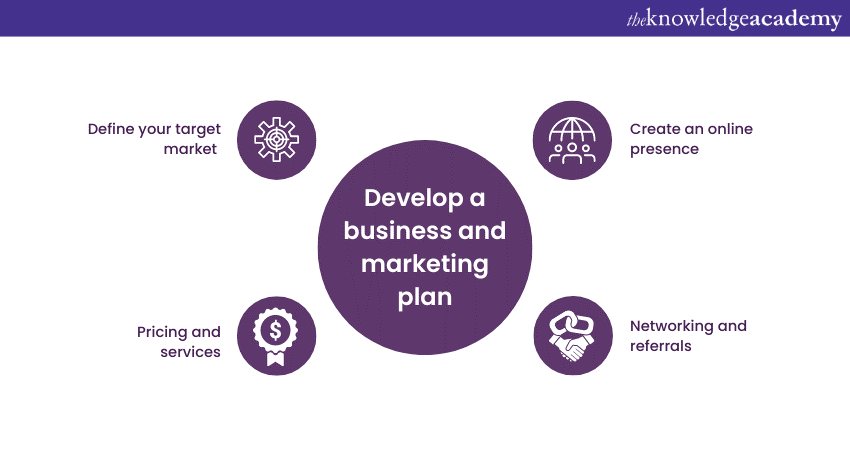We may not have the course you’re looking for. If you enquire or give us a call on 01344203999 and speak to our training experts, we may still be able to help with your training requirements.
Training Outcomes Within Your Budget!
We ensure quality, budget-alignment, and timely delivery by our expert instructors.

In the financial landscape, knowing How to Become a Financial Advisor opens doors to a dynamic career that bridges the gap between financial expertise and individuals seeking guidance. As our financial decisions grow increasingly complex, the role of a Financial Advisor becomes essential.
This blog on "How to Become a Financial Advisor" navigates the path to becoming a Financial Advisor, offering a clear roadmap from inception to establishment. Exploring beyond the surface, we'll understand the fundamental steps, educational prerequisites, skill enhancement strategies, and practical experiences necessary to excel in this field.
Table of contents
1) Step 1: Understand the role of a Financial Advisor
2) Step 2: Education and qualifications
3) Step 3: Develop financial knowledge and skills
4) Step 4: Gain practical experience
5) Step 5: Obtain necessary licenses
6) Step 6: Build a professional network
7) Step 7: Choose a niche or specialisation
8) Step 8: Develop a business and marketing plan
9) Step 9: Launch your Financial Advisory career
10) Conclusion
Step 1: Understand the role of a Financial Advisor
The journey of How to Become a Financial Advisor begins with thoroughly comprehending the role you'll assume. A Financial Advisor acts as a guiding beacon, providing clients with strategic insights to navigate the diversity of fiscal decisions. They decipher intricate investment options, optimise tax strategies, and tailor financial plans that align with clients' goals.
This role demands a grasp of numbers and excellent interpersonal skills, as advisors must adeptly communicate complex concepts to clients of varied financial literacy. By understanding that a Financial Advisor's essence lies in empowering individuals and businesses to make informed choices, you lay a solid foundation for your path ahead.
This understanding shapes your outlook and sets the tone for the knowledge, expertise, and commitment required to flourish in this impactful profession.
Gain knowledge on how to analyse financial statement, sign up for our Financial Management Training now!
Step 2: Education and qualifications
Achieving the aspiration of becoming a Financial Advisor hinges on acquiring the proper education and qualifications. This phase is the cornerstone of your expertise, preparing you to provide invaluable financial guidance.
Educational requirements
Gaining a solid educational foundation is paramount. A bachelor's degree in finance, economics, accounting, or a related field equips you with the fundamental knowledge to comprehend market trends, risk management, and financial analysis. A master's degree, such as an MBA, can offer a deeper understanding of complex financial strategies, enhancing your credibility and attracting potential clients.
Relevant degrees and certifications
Consider pursuing specialised certifications that boost your credibility. Credentials like Certified Financial Planner (CFP), Chartered Financial Analyst (CFA), or Chartered Investment Counsellor (CIC) demonstrate your commitment to excellence. These designations enhance your expertise and offer a competitive edge in the industry.
Step 3: Develop financial knowledge and skills
Becoming a proficient Financial Advisor demands consistently developing and refining your financial knowledge and skills. Stagnation in this ever-evolving landscape is not an option.

Stay current with industry trends
Remaining attuned to the dynamic shifts in financial markets is essential. Regularly read financial publications, follow reputable blogs, and engage in discussions to comprehend the latest trends. Staying updated with the market movements empowers you to offer timely insights to your clients, increasing their trust in your expertise.
Enhance communication skills
While numerical prowess is vital, effective communication sets exceptional Financial Advisors apart. Complex financial concepts can overwhelm clients; your ability to distil and convey these ideas in understandable terms is paramount. Hone your active listening, empathy, and explanation skills. The capacity to foster transparent and open dialogues facilitates a deeper understanding of your client's needs and ensures your advice is tailored to their unique circumstances.
Step 4: Gain practical experience
While theoretical knowledge lays the foundation, practical experience is crucial for developing expertise. Transitioning from the classroom to real-world scenarios is an essential part of your journey to becoming a seasoned Financial Advisor.
Internships and entry-level positions
Embarking on internships or entry-level positions in financial firms provides hands-on exposure to various facets of the industry. From analysing market trends to assisting in portfolio management, these experiences offer invaluable insights. They also allow you to observe senior advisors, learning from their strategies and client interactions.
Building a client portfolio
As you gain confidence, focus on building your client portfolio. Engage with friends, family, and acquaintances who might benefit from your expertise. Tailor financial plans to their unique goals and risk appetites. This hones your skills and establishes your reputation as a reliable advisor.
Step 5: Obtain necessary licenses
Obtaining the necessary license is crucial in the process of becoming a qualified Financial Advisor. These licenses establish credibility and ensure you are legally authorised to provide financial advice.
In addition to federal licenses, state-specific licenses might be required depending on where you plan to practice. Research the requirements of your particular state to ensure compliance with local regulations. This might involve additional exams or certifications.
Obtaining these licenses demands diligent study and preparation. Invest time in comprehensive exam courses and study materials. A solid understanding of regulatory guidelines and ethical considerations is essential. These licenses open doors to your advisory career and demonstrate your commitment to ethical practices and client protection.
Learn vital knowledge and skills needed to grow in Finance and Accounting, sign up for our Accounting & Finance Training now!
Step 6: Build a professional network
Building a robust professional network can be instrumental in your success in Financial Advisory. A well-cultivated network offers support and insights and presents opportunities for collaboration and growth.
Join industry associations
Participating in industry associations can connect you with like-minded professionals. These associations offer seminars, conferences, and forums where you can exchange ideas, learn from experts, and stay updated on industry trends.
Attend workshops and seminars
Continuously expand your knowledge by attending workshops and seminars. These events provide a platform for learning about emerging financial strategies, regulatory updates, and technological advancements. They're also excellent opportunities to network with fellow advisors and potential clients.
Step 7: Choose a niche or specialisation
As you progress toward becoming a Financial Advisor, considering a niche or specialisation can set you apart in a crowded field. Focusing on a specific area allows you to develop expertise that caters to the unique needs of a particular clientele.
Investment planning
Specialising in investment planning involves mastering the art of creating diverse portfolios that align with your client's financial goals and risk tolerance. You'll analyse market trends, select appropriate investment vehicles, and regularly review and adjust portfolios to ensure optimal performance.
Retirement planning
Retirement planning specialists guide clients through building a secure retirement future. This entails creating comprehensive plans encompassing savings, investments, Social Security, and pension strategies. Your expertise helps clients navigate retirement uncertainties with confidence.
Tax planning
Tax planning specialists focus on minimising the tax burden for their clients. You'll delve into complex tax codes, strategies deductions, and structure financial decisions to optimise tax implications. This specialisation requires a deep understanding of tax laws and evolving regulations.
Step 8: Develop a business and marketing plan

A comprehensive business and marketing plan is pivotal in shaping your identity as a Financial Advisor and attracting potential clients. This step involves strategic thinking and carefully considering how you'll establish and grow your advisory practice.
Define your target market
Demographic and psychographic characteristics identification of your ideal clients is crucial in understanding their needs, preferences, and pain points and will guide your services and communication strategies.
Create an online presence
Having a solid online presence in the digital age is essential. Develop a professional website showcasing your services, expertise, and client testimonials. Utilise social media platforms to share educational content, engage with your audience, and foster credibility.
Networking and referrals
Leverage your network and connections to generate referrals. Satisfied clients and professional contacts can become valuable sources of new business. Attend industry events, workshops, and seminars to expand your reach and build relationships.
Pricing and services
Determine your fee structure and the range of services you'll offer. Communicate the value you provide and the benefits of working with you. Transparency in pricing and services builds trust with potential clients.
Learn how to prepare a sole trader and a company’s financial statements, sing up for our Accounting Masterclass now!
Step 9: Launch your Financial Advisory career
As you approach the threshold of launching your Financial Advisory career, a strategic approach can succeed in entering the field. This step involves making crucial decisions about your employment options and the direction of your practice.
Finding employment opportunities
If you're considering joining an established firm, research various Financial Advisory firms to find a match for your skills and values. Look for firms that align with your niche or specialisation, and analyse their reputation, client base, and company culture.
Starting your practice
Venturing into independent practice demands meticulous planning. Develop a business plan, secure necessary licenses, set up your office infrastructure, and establish a robust client relationship management system. Focus on branding, marketing, and networking to attract clients.
Building a clientele
In both scenarios, building a client base is paramount. Leverage your network, referrals, and online presence to generate initial clients. Deliver exceptional service, communicate effectively, and prioritise your clients' financial well-being to foster trust and loyalty.
Conclusion
In this blog on "How to Become a Financial Advisor", we understood that embarking on this journey requires dedication, education, experience, and a commitment to continuous growth. By following these steps and harnessing your passion for financial guidance, you can forge a fulfilling and impactful career in this dynamic field.
Frequently Asked Questions
Upcoming Accounting and Finance Resources Batches & Dates
Date
 Financial Management Course
Financial Management Course
Fri 24th Jan 2025
Fri 28th Mar 2025
Fri 23rd May 2025
Fri 25th Jul 2025
Fri 26th Sep 2025
Fri 28th Nov 2025







 Top Rated Course
Top Rated Course



 If you wish to make any changes to your course, please
If you wish to make any changes to your course, please


